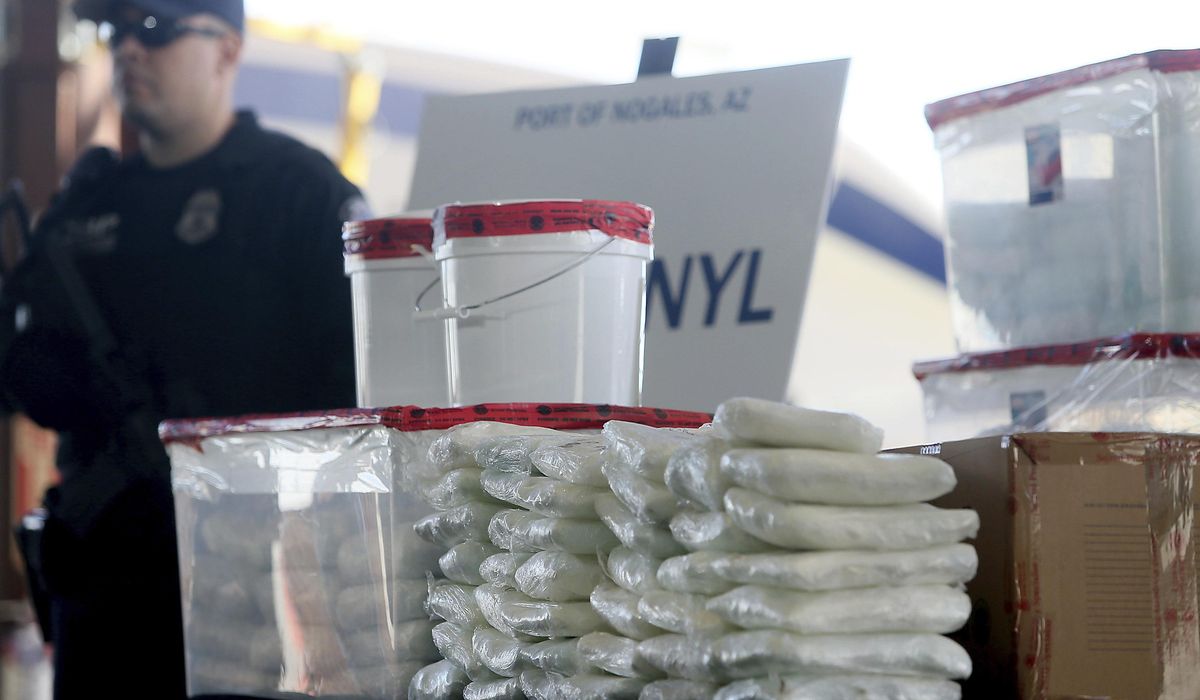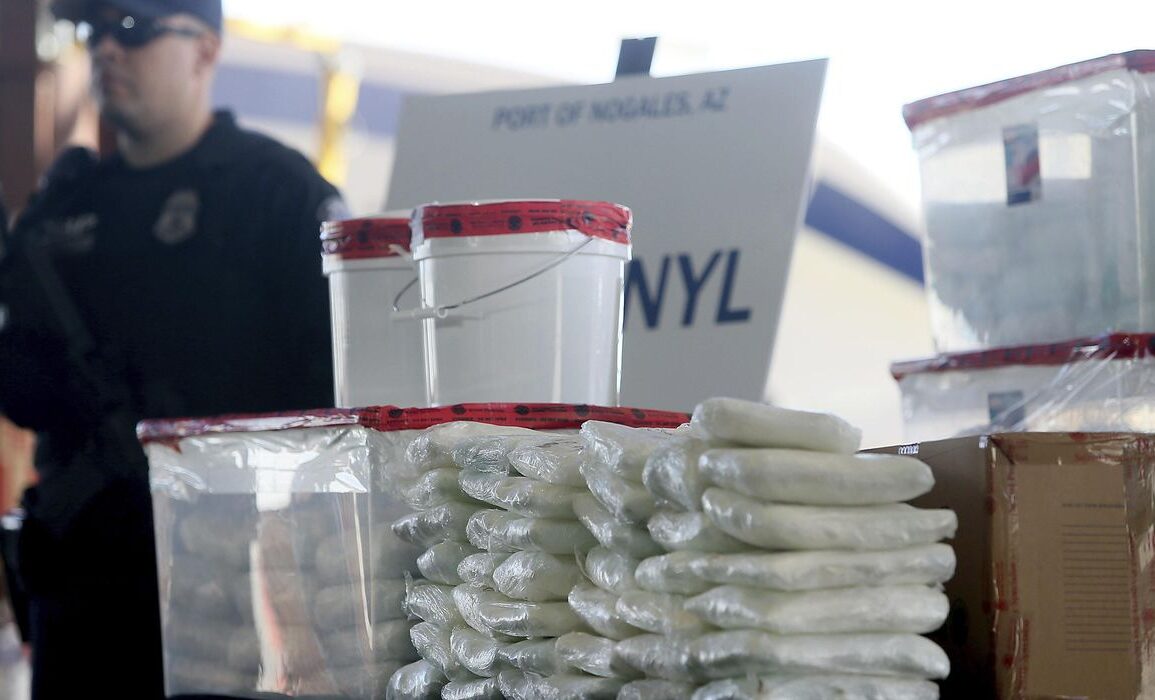
More states are tightening criminal penalties for fentanyl to combat the opioid crisis, sparking pushback from some activists and health officials who call the measures racist and ineffective.
Fentanyl, a powerful synthetic opioid, has fueled a decadelong surge in overdose deaths that worsened during COVID restrictions. More than 100,000 Americans die from drug overdoses annually.
In legal form, doctors prescribe fentanyl as a painkiller that is 50 to 100 times more potent than morphine. Counterfeit pills from China have increasingly flooded U.S. streets since 2013, along with illicit fentanyl powder manufactured in Chinese and Mexican drug labs with Chinese chemicals.
At least 28 states have passed fentanyl criminalization laws, according to the Legislative Analysis and Public Policy Association, which researches drug safety policies.
“Given the substantial increase in fentanyl-caused overdoses in most of the country, one could argue that no U.S. jurisdiction currently tackles the issue with complete success,” Jon Woodruff, the association’s managing attorney, said in an email. “Solving the issue will likely require demand-side intervention reducing individuals’ demand for illicit drugs along with supply-side intervention reducing the availability of illicit drugs.”
During the current legislative session, lawmakers in at least 46 state legislatures have introduced hundreds of bills proposing tighter fentanyl criminal penalties, according to the National Conference of State Legislatures. They include Texas, Iowa, Arkansas and Virginia.
“The tide needs to be reversed and lives saved,” Katharine Sullivan, a former Colorado state drug court judge and board member of the Recovery for America Now Foundation, told The Washington Times. “Nobody is advocating to just lock people up, but we can come together to enact responsible drug policy.”
A recovered alcoholic and former U.S. assistant deputy attorney general in the Trump administration, Ms. Sullivan supports making fentanyl traffickers expunge their criminal records by completing a licensed treatment program.
Not all states have declared a “war on drugs” approach to opioids, however.
States that have decriminalized fentanyl include New York and Rhode Island, which have legalized “safe injection sites” for users to feed their addictions without overdosing.
In the Midwest, Missouri lawmakers recently decriminalized the distribution and use of fentanyl testing strips, which allow users to monitor themselves for overdoses.
Out West, California Gov. Gavin Newsom announced in March that the state would spend $4 million to hand out free testing strips and $79 million to distribute free naxolone — an overdose-reversing drug — to fentanyl users. He also pledged $3.5 million to distribute free overdose medication to public middle and high schools.
According to advocates of “harm reduction strategies,” tighter criminal penalties worsen the opioid crisis while reinforcing racist prosecution and incarceration patterns.
Most low-level fentanyl dealers are addicts who need treatment rather than prison, said Maritza Perez Medina, director of federal affairs for the Drug Policy Alliance, a New York-based advocacy group opposed to banning addictive substances.
“The overwhelming majority of people prosecuted for fentanyl analog trafficking are Black and brown,” Ms. Perez Medina told The Times. “Imposing severe penalties on these individuals without addressing the root causes of problematic drug use perpetuates social disparities.”
Outlawing substances creates “a dangerous cycle” that pushes users toward harder drugs, she added.
“Lawmakers must focus on addressing the root causes of problematic drug use and activity by investing in social services and ensuring people have access to things like good-paying jobs, nutritious food, quality education, affordable housing and other life-affirming resources,” Ms. Perez Medina said.
According to the U.S. Sentencing Commission, fentanyl prosecutions jumped from 47 in fiscal 2018 to 126 in fiscal 2019 and have remained above 120 a year since then.
The number of fentanyl prosecutions reported to the commission hit 145 in fiscal 2022, the most recent year for which data is available. More than half of all offenders were Black, roughly 85% were men and their average age was 35.
Last year, the Drug Enforcement Agency seized more than 58.4 million fentanyl-laced fake pills and more than 13,000 pounds of fentanyl powder, the equivalent of more than 387.6 million lethal doses.
The Biden administration has requested a record-high $46.1 billion from Congress for national drug control programs. If granted, the figure would represent an increase of $2.3 billion from the federal funds allocated for fiscal 2023.
This week, the administration dispatched a delegation to Mexico to negotiate a crackdown on clandestine labs that make fentanyl with Chinese chemicals for smuggling across the southern border.
Criminal penalties should target accountants, smugglers and corrupt government officials in the global fentanyl pipeline rather than low-level dealers, said psychologist Keith Humphreys, a Stanford University addiction researcher who tracks the opioid crisis.
“The average street corner drug dealer is the ultimate in unskilled labor,” Mr. Humphreys said. “They will be immediately and easily replaced. However, for people who have unique skills or are unusually dangerous, it’s very useful to put them away for a long time.”
Under federal law, anyone the FBI or the Drug Enforcement Administration arrests for possessing at least 40 grams of fentanyl or 10 grams of a fentanyl analog faces a minimum charge of five years in federal prison. A lethal dose is roughly 2 milligrams.
Several states have moved this year to enact harsher penalties, saying they are necessary to curb distribution and hold offenders accountable. They include:
• Virginia lawmakers have designated fentanyl “a weapon of terrorism,” passing a bill this spring that makes knowingly creating or selling substances with even trace amounts of it punishable by up to 10 years in jail.
• A bipartisan Iowa law signed in May increased the penalties for selling and making fentanyl, prescribing prison sentences from up to 10 years to up to 50 years.
• Arkansas and Texas recently passed laws making it a homicide to give fentanyl to anyone who later dies from an overdose. The Texas law also makes it a first-degree felony to manufacture, distribute or possess shipments of fentanyl between 200 and 400 grams.
Other states have enacted tighter criminal penalties and harm reduction strategies.
In North Carolina, a bill advanced unanimously through the state Senate in March that would elevate criminal penalties for fentanyl dealers whose product causes an overdose death. If passed, it will let the state charge drug dealers with high-grade felonies for those deaths.
North Carolina already offers free syringes, community naloxone distribution and drug checks with fentanyl test strips to opioid users.
“In my experience as a trial judge, once the courtroom becomes merely the intake center for rehab, then the criminal justice system has failed in its endeavors to curb illicit substance abuse, particularly with more deadly drugs like fentanyl,” Phil Ginn, a retired district judge who served for 22 years in North Carolina county courts, said in an email.
Now the president of Southern Evangelical Seminary in Charlotte, Mr. Ginn also supports faith-based drug rehab programs to reduce the demand for fentanyl.
“What is needed, along with tougher drug laws, is more stringent faith-based drug abstinence programs within and without the penal system that do not simply substitute one drug for the other as their preferred method of treatment,” Mr. Ginn said.
This post was originally published on this site be sure to check out more of their content.







